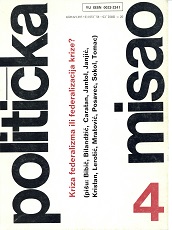Federalizam i konfederalizam
Federalism and Confederalism
Author(s): Tomislav JantolSubject(s): Politics, Political Theory, Political Sciences
Published by: Fakultet političkih znanosti u Zagrebu
Keywords: Federalism; Confederalism;
Summary/Abstract: Have the terms federalism and confederalism really become so obsolete as to be unable to express the political constitution of the Yugoslav community of self-managers? Yugoslav society is a class society, and the political form of the class society is the state. A state organized in such a manner as to grant statehood also to its constituent parts is a federation or confederation, depending on what portion of statehood belongs to the common state and what portion remains with the constituent states. According to the constitution, Yugoslavia is a federation, and its federal units are states of national communities. The statehood of national communities is a guarantee of their equality. United in a common state, national communities (nations and nationalities) transfer to it a part of their statehood, as manifested in the special competences of the federal state. It should be stressed that the solidity of the social community does not depend so much on the form (system) of the state community as on the basic production relation. Since the state is not merely the formal expression of the existing social community but also a factor of its evolvement, its organisation Is not without relevance. In view of the fact that the confederation tends to reinforce disintegrative and the federation the integrative, tendencies, the Yugoslav state community should be built as a federation. However, in order to help towards true commonalty, it must express the self-management subjectivity of the working people and the citizens (of their working and national communities), rather than expressing the alienated monopoly of bureaucratized power.
Journal: Politička Misao
- Issue Year: XXI/1984
- Issue No: 04
- Page Range: 53-58
- Page Count: 6
- Language: Croatian

